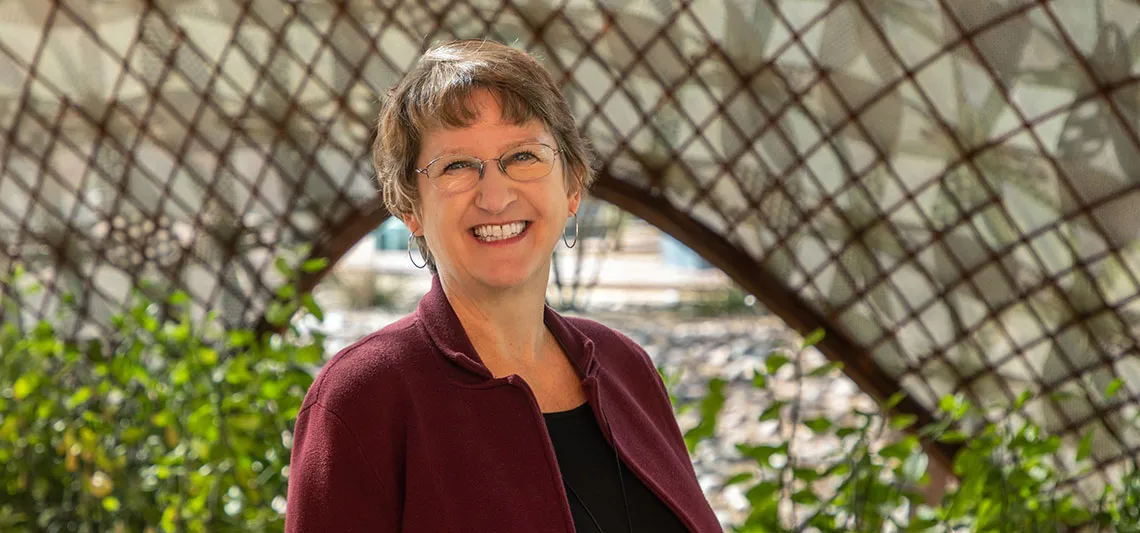Associate Professor Laura Hollengreen Wins Taubeneck Superior Teaching Award for ‘Localizing the Sacred’ Humanities Seminar

Laura Hollengreen, associate dean for academic affairs at the University of Arizona’s College of Architecture, Planning and Landscape Architecture, has been awarded the Ted and Shirley Taubeneck Superior Teaching Award for her Humanities Seminar Program course, Localizing the Sacred: Medieval Christian Architecture and Art.
It is the highest faculty honor given by the Humanities Seminars Program, a community program offered by UArizona College of Humanities. The annual award is based solely on student evaluations and “seeks to honor the pedagogical skill, depth of expertise and commitment to students demonstrated by the most outstanding faculty who teach for the Humanities Seminars Program,” according to the program.
While the award was announced this spring, Hollengreen taught the popular course in 2021, moving it online due to the pandemic. Given its success—and demand—a recorded version of the course is being offered again this summer.
Saints and cult sites were central to religious practice in the Christian Middle Ages, says Hollengreen. The course examined four sites (Qalʿat Simʿān, Constantinople, Conques and Chartres) over four weeks to find evolving concepts of sanctity and forms of cultic practice in medieval sociopolitical context, asking such questions as: When did new kinds of saints emerge? How did holy people interact with others in their societies? How does architecture spatialize perception of the sacred, and how does art focus it? Ranging from fifth-century Syria to 13th-century France, the buildings discussed included monastic and pilgrimage churches, a palace chapel and cathedrals. Artworks such as pilgrim’s tokens, mosaics, icons, manuscripts, reliquaries, statues, and stained-glass windows provided evidence of the devotional “zones of attraction” within these buildings, as well as the circulation of images beyond them and the rise of theories of art in the Middle Ages.
“This instructor was exceptional—the best I’ve experienced in University of Arizona Humanities Seminars, and one of the best in all virtual classes taken from other sources,” says one of the students in their evaluation, while another echoed Hollengreen’s teaching excellence: “Probably the most accessible and helpful instructor I’ve ever encountered at the Humanities Seminar Program. Hugely committed to course and students.”
In teaching the course, Hollengreen had two goals. “I aim to help students become more comfortable and confident in their thinking about architecture: how to describe it and how to analyze and contextualize it. I want students to know what makes for good architecture—in any period—so that they can be vocal in advocating for good architecture around us,” she says. “I also aim to help students realize that history is not given, but is constructed in the way we construe facts, establish elements of context and choose our perspectives.”
“Laura Hollengreen is a passionate scholar, great administrator and—as evidenced by this prestigious award—a talented teacher,” says CAPLA Dean Nancy Pollock-Ellwand. “I am impressed (but not at all surprised) by her erudition and insights, as well as how engaged the students are in her lectures.”
Hollengreen, who was appointed associate dean for academic affairs at CAPLA in 2019, is an associate professor of architecture. Trained at Princeton and UC Berkeley, she has taught the history of art at several universities and the history of architecture at UArizona and Georgia Tech. While most of her scholarship focuses on medieval topics, she has a longstanding interest in early 20th century artistic and architectural abstraction and the origins of the avant-garde, while her current research centers on a taxonomy of liminal environments. At CAPLA, she has offered courses on landscapes of war, urban public space, museum design, and light in modern and contemporary art and architecture.



